Here we are providing Real Numbers Class 10 Extra Questions Maths Chapter 1 with Answers Solutions, Extra Questions for Class 10 Maths was designed by subject expert teachers.
Extra Questions for Class 10 Maths Real Numbers with Answers Solutions
Extra Questions for Class 10 Maths Chapter 1 Real Numbers with Solutions Answers
Real Numbers Class 10 Extra Questions Very Short Answer Type
Question 1.
What is the HCF of the smallest composite number and the smallest prime number?
Solution:
Smallest composite number = 4
Smallest prime number = 2
So, HCF (4, 2) = 2
Question 2.
The decimal representation of \(\frac{6}{1250}\) will terminate after how many places of decimal?
Solution:

This representation will terminate after 4 decimal places.
Question 3.
If HCF of a and b is 12 and product of these numbers is 1800. Then what is LCM of these numbers?
Solution:
Product of two numbers = Product of their LCM and HCF
⇒ 1800 = 12 × LCM
⇒ LCM = \(\frac{1800}{12}\) = 150.
Question 4.
What is the HCF of 33 × 5 and 32 × 52?
Solution:
HCF of 33 × 5 and 32 × 52 = 32 × 5 = 45
Question 5.
if a is an odd number, b is not divisible by 3 and LCM of a and b is P, what is the LCM of 3a and 2b?
Solution:
6P
Question 6.
If P is prime number then, what is the LCM of P, P2, P3?
Solution:
P3
Question 7.
Two positive integers p and q can be expressed as p = ab2 and q = a2b, a and b are prime numbers. What is the LCM of p and q?
Solution:
a2h2
Question 8.
A number N when divided by 14 gives the remainder 5. What is the remainder when the same
number is divided by 7?
Solution:
5, because 14 is multiple of 7.
Therefore, remainder in both cases are same.
Question 9.
Examine whether \(\frac{17}{30}\) is a terminating decimal or not.
Solution:
![]()
Since the denominator has 3 as its factor.
∴ \(\frac{17}{30}\) is a non4ermznatlng decimal.
Question 10.
What are the possible values of remainder r, when a positive integer a is divided by 3?
Solution:
According to Euclid’s division lemma
a = 3q + r, where O r < 3 and r is an integer.
Therefore, the values of r can be 0, 1 or 2.
Question 11.
A rational number in its decimal expansion is 1.7351. What can you say about the prime factors of q when this number is expressed in the form \(\frac{p}{q}\) ? Give reason.
Solution:
As 1.7351 is a terminating decimal number, so q must be of the form 2m 5n, where in, n are natural numbers.
Question 12.
Without actually performing the long division, find \(\frac{987}{10500}\) will have terminating or non.terminating repeating decimal expansion. Give reason for your answer.
Solution:
\(\frac{987}{10500}\) = \(\frac{47}{500}\) and 500 = 22 × 53, so it has terminating decimal expansion.
Real Numbers Class 10 Extra Questions Short Answer Type 1
Question 1.
Can the number 4n, n be a natural number, end with the digit 0? Give reason.
Solution:
if 4n ends with 0, then it must have 5 as a factor. But, (4)n = (22)n = 22n i.e., the only prime factor
of 4n is 2. Also, we know from the fundamental theorem of arithmetic that the prime factorization of each number is unique.
∴ 4n can never end with 0.
Question 2.
Write whether the square of any positive integer can be of the form 3m + 2, where m is a natural number. Justify your answer.
Solution:
No, because any positive integer can be written as 3q, 3q + 1, 3q + 2, therefore, square will be
9q2 = 3m, 9q2 + 6q + 1 = 3(3q2+ 2q) + 1 = 3m + 1,
9q2 + 12q + 4 = 3(3q2+ 4q + 1) + 1 = 3m + 1.
Question 3.
Can two numbers have 18 as their HCF and 380 as their LCM? Give reason.
Solution:
No, because here HCF (18) does not divide LCM (380).
Question 4.
Write a rational number between √3 and √5.
Solution:
A rational number between √3 and √5 is √3.24 = 1.8 = \(\frac{18}{10}\) = \(\frac{9}{5}\)
Question 5.
The product of two consecutive integers is divisible by 2. Is this statement true or false? Give reason.
Solution:
True, because n(n + 1) will always be even, as one out of the n or n+ 1 must be even.
Question 6.
Explain why 3 × 5 × 7 + 7 is a composite number.
Solution:
3 × 5 × 7 + 7 = 7(3 × 5 + 1) = 7 × 16, which has more than two factors.
Question 7.
What is the least number that is divisible by all the numbers from 1 to 10?
Solution:
Required number = LCM of 1, 2, 3, … 10 = 2520
Question 8.
Find the sum \(0 . \overline{68}\) + \(0 . \overline{73}\).
Solution:
![]()
Question 9.
“The product of three consecutive positive integers is divisible by 6”. Is this statement true or false? Justify your answer.
Solution:
True, because n(n + 1) (n + 2) will always be divisible by 6, as at least one of the factors will be divisible by 2 and at least one of the factors will be divisible by 3.
Real Numbers Class 10 Extra Questions Short Answer Type 2
Question 1.
An army contingent of 616 members is to march behind an army band of 32 members in a parade. The two groups are to march in the same number of columns. What is the maximum number of columns in which they can march?
Solution:
For the maximum number of columns, we have to find the HCF of 616 and 32.
Now, since 616 > 32, we apply division lemma to 616 and 32.
We have, 616 = 32 × 19 + 8
Here, remainder 8 ≠ O. So, we again apply division lemma to 32 and 8.
We have, 32 = 8 × 4 + O
Here, remainder is zero. So, HCF (616, 32) = 8
Hence, maximum number of columns is 8.
Question 2.
Find the LCM and HCF of 12, 15 and 21 by applying the prime factorisation method.
Solution:
The prime factors of 12, 15 and 21 are
12 22 × 3, 15 = 3 × 5 and 21 = 3 × 7
Therefore, the HCF of these integers is 3.
22, 31, 51 and 71 and are the greatest powers involved in the prime factors of 12, 15 and 21.
So, LCM (12, 15, 21) = 22 × 31 × 51 × 71 = 420.
Question 3.
Find the LCM and HCF of the following pairs of integers and verify that LCM × HCF = product of the two numbers.
(1) 26 and 91 (ii) 198 and 144
Solution:
(i) We have, 26 = 2 × 13 and 91 = 7 × 13
Thus, LCM (26, 91) = 2 × 7 × 13 = 182
HCF (26, 91) = 13
Now, LCM (26, 91) × HCF (26, 91) = 182 × 13 = 2366
and Product of the two numbers = 26 × 91 = 2366
Hence, LCM × HCF = Product of two numbers.
(ii) 144 = 24 × 32 and 198 = 2 × 32 × 11
∴ LCM(198,144)24 × 32 × 11 = 1584
HCF(198, 144) = 2 × 32 = 18
Now, LCM (198, 144) × HCF (198, 144) = 1584 × 18 = 28512
and product of 198 and 144 = 28512
Thus, product of LCM (198, 144) and HCF (198, 144)
= Product of 198 and 144.
Question 4.
There is a circular path around a sports field. Sonia takes 18 minutes to drive one round of the field, while Ravi takes 12 minutes for the same. Suppose they both start from the same point and at the same time, and go in the same direction. After how many minutes will they meet again at the starting point?
Solution:
To find the time after which they meet again at the starting point, we have to find LCM of 18 and 12 minutes. We have
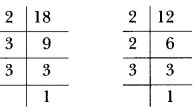
Therefore, LCM of 18 and 12 = 22 × 32 = 36
So, they will meet again at the starting point after 36 minutes.
Question 5.
Write down the decimal expansiwns of the following numbers:
(i) \(\frac{35}{50}\) (ii) \(\frac{15}{1600}\)
Solution:
(i)

(ii)

Question 6.
Express the number \(0.3 \overline{178}\) in the form of rational number \(\frac{a}{b}\)
Solution:
Let x = \(0.3 \overline{178}\)
then x = 0.3178178178 … … (1)
10x = 3.178178178 … …(ii)
10000x = 3178.178178… …(iii)
On subtracting (ii) from (iii), we get

Question 7.
If n is an odd positive integer, show that (n2 – 1) is divisible by 8.
Solution:
We know that an odd positive integer n is of the form (4q + 1) or (4 + 3) for some integer q.
Case – I When n = (4q + 1)
In this case n2 – 1 = (4q + 1)21 = 16q2 + 8q = 8q(2q + 1)
which is clearly divisible by 8.
Case – II When n = (4q + 3)
In this case, we have
n22 = (4q + 3)2 – 1 = 16q2 + 24q + 8 = 8(2q2+ 3q + 1)
which is clearly divisible by 8.
Hence (n2 – 1) is divisible by 8.
Question 8.
The LCM of two numbers is 14 times their HCF. The sum of LCM and HCF is 600. If one
number is 280, then find the other number.
Solution:
Let HCF of the numbers hex then according to question LCM of the number will be 14x
And x + 14 = 600 ⇒ 15x = 600 ⇒ x = 40
Then HCF = 40 and LCM = 14 × 40 = 560
∵ LCM × HCF = Product of the numbers
560 × 40 = 280 × Second number Second number = \(\frac{560 \times 40}{280}\) = 80
Then other number is 80
Question 9.
Find the value of x, y and z in the given factor tree. Can the value of ‘x’ be found without finding the value of ‘y’ and ‘z’? If yes, explain.
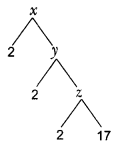
Solution:
z = 2 × 17 = 34; y = 34 × 2 = 68 and x = 2 × 68 = 136
Yes, value of x can be found without finding value of y or z as
x = 2 × 2 × 2 × 17 which arc prime 1tctors of x.
Question 10.
Show that any positive odd integer is of the form 6q + 1 or 6q + S or 6q + 5 where q is some integer.
Solution:
Let a he any positive odd integer and h = 6. Then, by Euclid’s algorithm, a = 6q + r, for some
integer q ≥ O and O ≤ r < 6.
i.e., the possible remainders are 0, 1, 2, 3, 4, 5.
1’hus,a canbeoftheform6q,or6q + I,or6q + 2,orßq + 3,ör6q + 4,
or 6q + 5, where q is some quotient.
Since a. is odd integer, so a cannot be of the form , or + 2, or 6q + 4, (since they are even).
Thus, a is of the form 6q + 1, 6q + 3, or 6q + 5, where q is some integer.
Hence, any odd positive integer is of the form 6q + 1 or 6q -1- 3 or 6q + 5, where q is sorne integer.
Question 11.
The decimal expansions of some real numbers are given below. In each case, decide whether they are rational or not. If they are rational, write it in the form \(\frac{p}{q}\). What can you say about the prime factors of q?
(i) 0.140140014000140000… (ii) \(0 . \overline{16}\)
Solution:
(i) We have, 0.140140014000140000… a non-terminating and non-repeating decimal expansion. So it is irrational. It cannot be written in the form of \(\frac{p}{q}\)
(ii) We have, \(0 . \overline{16}\) a non-terminating but repeating decimal expansion. So it is rational.
Let x = \(0 . \overline{16}\)
Then, x = 0.1616… (i)
100×16.1616… ..(ii)
On subtracting (i) from (ii), we get
100x – x = 16.1616 – 0.1616
⇒ 99x = 16 ⇒ x = \(\frac{16}{99}\) = \(\frac{p}{q}\)
The denominator (q) has factors other than 2 or 5.
Real Numbers Class 10 Extra Questions Long Answer Type 1
Question 1.
Use Euclid’s division lemma to show that the square of any positive integer is either of the form 3m or 3m + 1 for some integer m.
Solution:
Let a be an arbitrary positive integer.
Then by Euclid’s division algorithm, corresponding to the positive integers a and 3 there exist
non-negative integers q and r such that
a = 3q + r where 0 ≤ r <3
a2 = 9q2 + 6qr + r2 ….(i) 0 ≤ r <3
Case – I: When r = 0 [putting in (i)]
a2 = 9q2 = 3(3q2) = 3m where m = 3q2
Case – II: r = 1
a2 = 9q2+6q + 1 = 3(3q2 + 2q)+ 1 = 3m + 1 where m = 3q2 + 2q
Case – III: r = 2
a2 = 9q2 + 12 + 4 = 3(3q2 + 4q + 1) + 1 = 3m + 1 where m = (3q2 + 4q + 1)
Hence, square of any positive integer is either of the form 3m or 3m + 1 for some integer m.
Question 2.
Show that one and only one out of n, n + 2, n + 4 is divisible by 3, where n is any positive integer.
Solution:
Let q be the quotient and r be the remainder when n is divided by 3.
Therefore, n = 3q + r, where r = 0, 1, 2
n = 3q or n = 3q + 1 or n = 3q + 2
Case (i) if n = 3q, then n is divisible by 3, n + 2 and n +. 4 arc not divisible by 3.
Case (ii) if 71 = 3q + 1 then n + 2 = 3q + 3 = 3(q + 1), which is divisible by 3 and
n + 4 = 3q + 5, which is not divisible by 3.
So, only (n + 2) is divisible by 3.
Case (iii) If n = 3q + 2, then n + 2 = 3q + 4, which is not divisible by 3 and
(n + 4) = 3q + 6 = 3(q + 2), which is divisible by 3.
So, only (n + 4) is divisible by 3.
Hence one and only one out of n, (n + 2), (n + 4), is divisible by 3.
Question 3.
Use Euclid’s division algorithm to find the HCF of:
(i) 960and432
(ii) 4052 and 12576.
Solution:
(j) Since 960 > 432, we apply the division lemma to 960 and 432.
We have, 960 = 432 × 2 + 96
Since the remainder 96 ≠ 0, so we apply the division lemma to 432 and 96.
We have, 432 = 96 × 4 + 48
Again remainder 48 ≠ 0 so we again apply division lemma to 96 and 48.
We have, 96 = 48 × 2 + O
The remainder has now become zero. So our procedure stops.
Since the divisor at this stage is 48.
Hence, HOE of 960 and 432 is 48.
i.e., HCF (960, 432) = 4H
(ii) Since 12576 > 4052, we apply the division lemma to 12576 and 4052, to get
12576 = 4052 × 3 + 420
Since the remainder 420 ≠ 0, we apply the division lemma to 4052 and 420, to get
4052 = 420 × 9 + 272
We consider the new divisor 420 and the new remainder 272, and apply the division lemma to get
420 = 272 × 1 + 148
We consider the new divisor 272 and the new remainder 148, and apply the division lemma to get
272 = 148 × 1 + 124
We consider the new divisor 148 and the new remainder 124, and apply the division lemma to get
148 = 124 × 1 + 24
We consider the new divisor 124 and the new remainder 24, and apply the division lemma to get
124 = 24 × 5 + 4
We consider the new divisor 24 and the new remainder 4, and apply the division lemma to get
24 = 4 × 6 + O
The remainder has now become zero, so our procedure stops. Since the divisor at this stage is 4, the HCF of 12576 and 4052 is 4.
Question 4.
Using prime factorisation method, find the HCF and LCM of 30, 72 and 432. Also show that HCF × LCM ≠ Product of the three numbers.
Solution:
Given members = 30, 72, 432 .
30 = 2 × 3 × 5; 72 = 23 × 32 and 432 = 24 × 33
Here, 2’ and 31 are the smallest powers of the common factors 2 and 3 respectively.
So, HCF (30, 72, 432) = 21 × 31 = 2× 3 = 6
Again, 2, 33 and 51 arc the greatest powers of the prime factors 2, 3 and 5 respectively.
So, LCM (30, 72, 432) = 24 × 33 × 51 = 2160
HCF × LCM = 6 × 2160 = 12960
Product of numbers = 30 × 72 × 432 = 933120 .
Therefore, HCF × LCM ≠ Product of the numbers.
Question 5.
Prove that √7 is an irrational number.
Solution:
Let us assume, to the contrary, that √7 is a rational number.
Then, there exist co-prime positive integers and such that
√7 = \(\frac{a}{b}\) , b ≠ 0
So, a = √7 b
Squaring both sides, we have
a2 = 7b2 …… (i)
⇒ 7 divides a2 ⇒ 7 divides a
So, we can write
a = 7c (where c is an integer)
Putting the value of a = 7c in (i), we have
49c2 = 7b2 72 = b2
It means 7 divides b2 and so 7 divides b.
So, 7 is a common factor of both a and b which is a contradiction.
So, our assumption that √7 is rational is wrong.
Hence, we conclude that √7 is an irrational number.
Question 6.
Show that 5 – √3 is an irrational number.
Solution:
Let us assume that 5 – √3 is rational.
So, 5 – √3 may be written as
5 – √3 = \(\frac{p}{q}\), where p and q are integers, having no common factor except 1 and q ≠ 0.
⇒ 5 – \(\frac{p}{q}\) = √3 ⇒ √3 = \(\frac{5 q-p}{q}\)
Since \(\frac{5 q-p}{q}\) is a rational number as p and q are integers.
∴ √3 is also a rational number which is a contradiction.
Thus, our assumption is wrong.
Hence, 5 – √3 is an irrational number.
Question 7.
Using Euclid’s division algorithm, find whether the pair of numbers 847,2160 are co-prime or not.
Solution:
Since 2160 > 847 we apply the division lemma to 2160 and 847
we have, 2160 847 × 2 + 466
Since remainder 466 ≠ 0. So, we apply the division lemma to 847 and 466
847 = 466 × 1+ 381
Again remainder 381 ≠ 0. So we again apply the division lemma to 466 and 381.
466 = 381 × 1 + 85
Again remainder 85 ≠0. So, we again apply the division lemma to 381 and 85
381 = 85 × 4 + 41
Again remainder 41 ≠ 0. So, we again apply the division lemma to 85 and 41.
85 = 41 × 2 + 3
Again remainder 3 ≠ 0. So, we again apply the division lemma to 4 1 and 3.
41 = 3 × 13 + 2
Again remainder 2 ≠ 0. So, we again apply the division lemma to 3 and 2.
3 = 2 × 1 + 1
Again remainder 1 ≠ 0. So, we apply division lemma to 2 and 1
2 = 1 × 2 + 0
The remainder now becomes O. So, our procedure stops.
Since the divisor at this stage is 1.
Hence, HCF of 847 and 2160 is 1 and numbers are co-prime.
Question 8.
Check whether 6n can end with the digit O for any natural number n.
Solution:
If the number 6n, for any n, were to end with the digit zero, then h would bc divisible by 5. That is, the prime factorisation of 6n would contain the prime 5. But 6n = (2 × 3)n = 2n × 3n So the primes in factorisation of 6n are 2 and 3. So the uniqueness of the Fundamental Theorem of Arithmetic guarantees that (here are no other primes except 2 and 3 in the factorisation of 6n. So there is no natural number n for which 6” ends with digit zero.
Real Numbers Class 10 Extra Questions HOTS
Question 1.
Show that there is iw positive integer n for which \(\sqrt{n-1}\) + \(\sqrt{n+1}\) is rational.
Solution:
Let there be a positive integer n for which \(\sqrt{n-1}\) + \(\sqrt{n+1}\) be rational number.
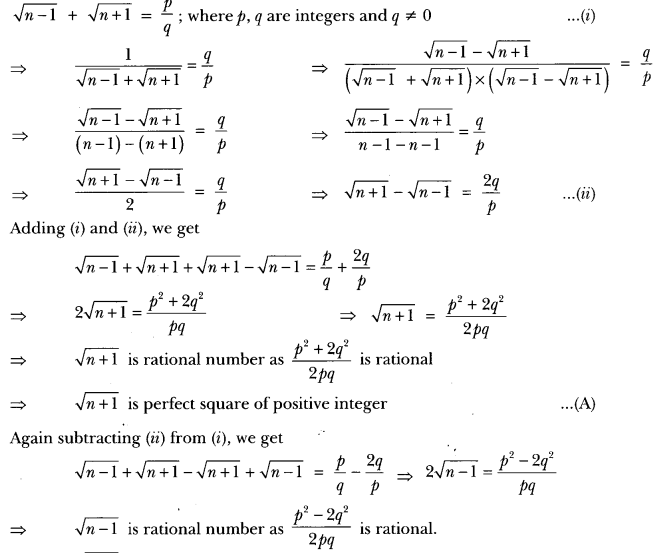
⇒ \(\sqrt{n-1}\) is also perfect. square of positive integer From (A) and (B)
\(\sqrt{n+1}\) and \(\sqrt{n-1}\) are perfect squares of positive integer. It contradict the fact that two perfect
squares differ at least by 3.
Hence, there is no positive integer n for which\(\sqrt{n-1}\) + \(\sqrt{n+1}\) is rational.
Question 2.
Let a, b, e, k be rational numbers such that k is not a perfect cube. if a + bk1/2 + ck2/3 then prove that a = b, c = 0.
Solution:
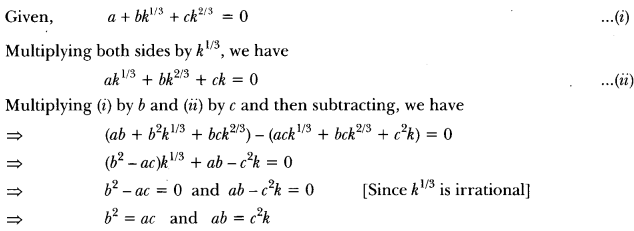
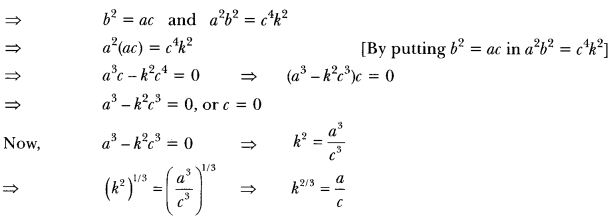
This is impossible as k2/3 is irrational and \(\frac{a}{c}\) is rational.
∴ a3 – k2c3 ≠ 0
Hence, c = 0
Substituting c = 0 in b2 – ac = 0, we get b = 0
Substituting b = 0 and c = 0 in a + bk1/3 + ck2/3= 0, we get a = 0
Hence, a = b = c = 0
Question 3.
Find the largest positive integer that will divide 398, 436 and 542 leaving remainders 7, 11 and 15 respectively.
Solution:
It is given that on dividing 398 by the required number, there is a remainder of 7. This means that 398 – 7 = 391 is exactly divisible by the required timber In other words, required number is a factor of 391.
Similarly, required positive integer is a Íctor of 436 – 11 = 425 and 542 – 15 = 527
Clearly, the required number is the HCF of 391, 425 and 527.
Using the factor tree, we get the prime factorisations of 391, 425 and 527 as follows:
391 = 17 × 23, 425 52 × 17 and 527 17 × 31
∴ HCF of 391, 425, and 527 is 17.
Hence, the required number = 17.